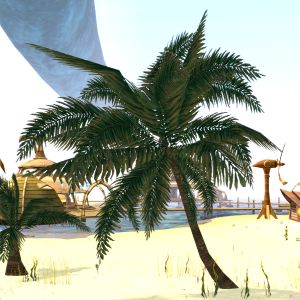From EncyclopAtys
| Taxonomic Amber | |
| Olansis near Fairhaven | |
|---|---|

| |
| Kingdom | Plants |
| Category | Stipe (pseudostem) |
| Main Ecosystem(s) | Desert |
| Counterattack type | None |
Smaller than its cousin of the Desert of which it shares the name, this plant with stem or false-trunk is not a tree. In fact the best botanists believe that it is more like a grass.
The foliar crown numbers between ten and twenty leaves, sometimes exceeding twenty feet long.
A single bud produces all the leaves and flowers. This bud operates continuously: the olansi therefore grows continuously until it dies. Although the bud is very well protected, its uniqueness gives the plant a certain fragility. It cannot withstand the cold.
The olansi produces male and female flowers and therefore can fertilize itself. Its fruit looks like a round nut and contains an edible whitish pulp.
The Trykers extract its oil for multiple uses and employ its shell to craft containers, among other things. Its leaves are braided to serve in furniture construction. The largest of them exude a kind of resin used in the manufacture of portholes. Its wood has a fibrous grain with two different densities, the hardest part being on the outer perimeter of the trunk.
Like all its cousins it does not produce growth rings as trees do and it therefore shows no knot or other imperfection of that kind. It is used in construction and joinery.




